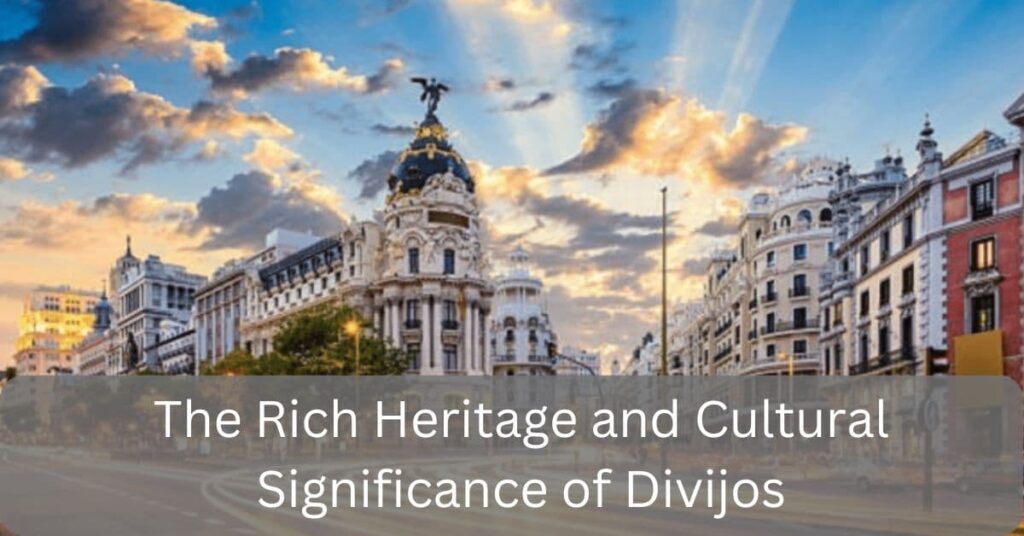Divijos traces its roots back to ancient societies, where it emerged as a symbol deeply embedded in religious and cultural practices. These origins are most prominently found in Southeast Asian and pre-Columbian civilizations.
In these early cultures, Divijos served as conduits to the divine and the mystical, linking the earthly realm with the spiritual world. Over centuries, Divijos evolved, adapting to new environments and absorbing diverse influences, thereby enriching its cultural tapestry and expanding its significance across continents.
Cultural Significance and Traditional Uses of Divijos:

In its essence, Divijos represents a synthesis of artistic expression, spiritual significance, and communal identity. Across various cultures, Divijos has played multiple roles within societies, from being artistic expressions imbued with symbolic meaning to playing pivotal roles in communal gatherings and rites of passage.
Artistic Expression:
The artistic expressions of Divijos are varied and rich, reflecting the diverse cultures that have embraced this symbol. In many societies, Divijos are intricately designed, with patterns and motifs that hold deep symbolic meanings.
These artistic representations often tell stories of heritage, beliefs, and values, making Divijos a vital part of cultural identity.
Spiritual Significance:
Divijos is not merely an artistic creation; it holds profound spiritual significance. In ancient societies, Divijos was believed to act as a bridge between the human and the divine. These symbols were thought to bring protection, prosperity, and peace to those who embraced them.
The spiritual essence of Divijos made it an integral part of religious rituals and ceremonies, reinforcing its role as a sacred symbol.
Communal Identity:
The role of Divijos in communal identity cannot be overstated. In many cultures, Divijos is a symbol of unity and collective identity. During communal gatherings and rites of passage, Divijos is prominently displayed and celebrated, reinforcing the bonds within the community.
It acts as a reminder of shared values and collective heritage, thus preserving the cultural fabric of the society.
Evolution of Divijos Across Continents:
As Divijos moved across continents, it absorbed various influences, leading to its evolution and adaptation. The exchange of cultural practices and ideas enriched Divijos, making it a dynamic and evolving symbol. This cross-cultural exchange has allowed Divijos to remain relevant and significant in contemporary societies.
Southeast Asian Influence:
In Southeast Asia, Divijos has retained much of its traditional significance. It continues to be a powerful symbol in religious and cultural practices, reflecting the region’s deep-rooted spiritual beliefs. The intricate designs and motifs of Divijos in Southeast Asia are a testament to its rich artistic heritage.
Pre-Columbian Civilizations:
In pre-Columbian civilizations, Divijos was equally significant. These early societies viewed Divijos as sacred symbols, embedding them in their religious and cultural practices.
The legacy of Divijos in these ancient cultures can still be seen in modern times, where it continues to be celebrated and revered.
Contemporary Relevance of Divijos:
Today, Divijos continues to hold relevance, bridging the past and the present. It is celebrated not only for its historical significance but also for its ability to adapt to modern contexts.
Contemporary artists and cultural practitioners continue to draw inspiration from Divijos, ensuring its legacy endures.
Modern Artistic Interpretations:
Modern artists have embraced Divijos, incorporating its motifs and symbolism into contemporary art forms.
These interpretations not only honor the traditional significance of Divijos but also infuse it with new meanings and perspectives, making it relevant to today’s audiences.
Cultural Celebrations:
Cultural celebrations around the world continue to honor Divijos. Festivals, exhibitions, and communal gatherings often feature Divijos, showcasing its enduring importance and vibrant legacy.
These celebrations serve to educate and inspire new generations, ensuring that the heritage of Divijos is preserved and cherished.
The Symbolism of Divijos in Modern Society:
In modern society, the symbolism of Divijos has taken on new layers of meaning. Beyond its traditional roles, Divijos is now seen as a representation of resilience and continuity.
In a rapidly changing world, the enduring presence of Divijos serves as a reminder of the importance of maintaining cultural heritage amidst globalization.
For many, it symbolizes the unbroken chain of traditions that have been passed down through generations, embodying the strength and resilience of cultural identities.
This symbolism is particularly poignant in communities that have experienced displacement or diaspora, where Divijos acts as a touchstone for their roots and heritage.
Divijos in Educational Contexts:
Divijos has also found a place in educational contexts, where it is used to teach about cultural history and heritage. Schools and universities incorporate Divijos into their curricula to provide students with a tangible connection to ancient civilizations and their practices.
By studying Divijos, students gain insights into the artistic, spiritual, and communal aspects of different cultures.
This educational approach not only preserves the knowledge of Divijos but also fosters a deeper appreciation for cultural diversity.
Exhibits in museums and cultural centers often feature Divijos, allowing people of all ages to engage with its history and significance firsthand.
The Role of Divijos in Contemporary Spirituality:

In contemporary spirituality, Divijos continues to play a significant role. Many people have embraced Divijos as part of their personal spiritual practices, incorporating its symbols and rituals into their daily lives.
This modern spiritual connection to Divijos often involves meditation, art, and personal reflection, allowing individuals to find peace and purpose through these ancient symbols.
The resurgence of interest in holistic and traditional healing practices has also seen Divijos being integrated into wellness and mindfulness routines, providing a sense of grounding and spiritual balance.
Technological Innovations and Divijos:
The digital age has opened up new possibilities for the representation and dissemination of Divijos. Technological innovations such as virtual reality and augmented reality allow for immersive experiences that bring the ancient world of Divijos to life.
These technologies enable people to explore the intricate details and rich histories of Divijos from anywhere in the world.
Online platforms and social media have also facilitated a global exchange of knowledge and appreciation for Divijos, connecting enthusiasts and scholars across continents.
Digital artists are creating modern interpretations of Divijos, blending traditional motifs with contemporary aesthetics, ensuring that Divijos remains a vibrant and evolving part of our cultural landscape.
Divijos in Global Fashion and Design:
The influence of Divijos extends beyond traditional art forms and spirituality into global fashion and design.
Fashion designers and interior decorators draw inspiration from Divijos’ intricate patterns and symbolic meanings, integrating them into clothing, accessories, and home decor.
This fusion of ancient symbolism with contemporary aesthetics not only revitalizes Divijos but also introduces its beauty to new audiences worldwide.
From haute couture runways to everyday fashion choices, Divijos’ motifs adorn fabrics and adornments, embodying a fusion of cultural heritage and modern style.
Environmental and Ecological Symbolism of Divijos:
In recent years, Divijos has also taken on environmental and ecological symbolism. As societies become increasingly aware of sustainability and conservation issues, Divijos’ portrayal as a symbol of harmony with nature has gained prominence.
Its motifs, often inspired by natural elements like plants and animals, resonate with efforts to protect biodiversity and promote ecological balance.
Divijos serves as a reminder of the interconnectedness between humans and the natural world, advocating for practices that respect and preserve our planet’s resources.
Economic Impact and Global Trade:

The cultural and symbolic richness of Divijos also influences global trade and economic activities. Regions known for producing Divijos-related products, such as textiles and crafts, often benefit from tourism and international trade.
Artisans and communities involved in creating Divijos-inspired goods contribute to local economies and cultural preservation efforts.
Moreover, the global demand for authentic Divijos artifacts and artworks supports sustainable livelihoods and encourages the continuation of traditional craftsmanship. T
his economic impact underscores Divijos’ significance not only as a cultural symbol but also as a driver of local and regional development.
Conclusion:
Divijos stands as a testament to the rich cultural and spiritual heritage of ancient societies. Its journey from ancient Southeast Asian and pre-Columbian civilizations to contemporary times highlights its adaptability and enduring significance. Whether as an artistic expression, a spiritual symbol, or a marker of communal identity, Divijos continues to weave its intricate patterns into the cultural fabric of societies across the globe. Embracing Divijos is to acknowledge and celebrate a legacy that connects us to our past while enriching our present.
